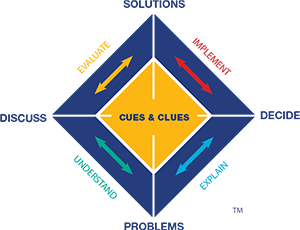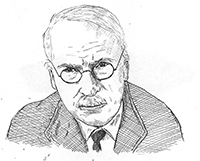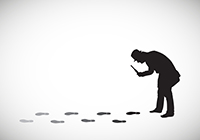Cues and Clues
-
-

These appear in every problem solving discussion. Recognizing them can help you keep ahead in the resolution of problems. We shall focus here mainly on the verbal cues and clues – as distinct from signs and signals which relate more to other forms of behavior, like turning up late for meetings and other visual feedback.
Cues and clues come from the words people use and the way they use them. In effect, you give cues to others via your choice of concepts and expression. You want people to pick up these cue words and respond. In return, other people give clues. For example, you say to another person, “I am not sure we are on the right track with this issue, and I think we need to find out a bit more about what the client wants”. You are giving a strong cue that you want to be more problem focused and to put more time into enquiring, summarizing and diagnosing.
The other person may respond and say, “Let’s press on and develop this further as I think it will work”. That is a strong clue that the other person wants to focus on the solution, evaluate the proposal and coordinate the action.
Sometimes cues and clues may not be as clear. You have to listen for the key words, to understand what people really mean, as they do not always talk directly. This can be the case when they are not sure if their information will be held in confidence, or perhaps that you will react emotionally to their concerns, or reject them all together. Therefore, they offer clue words to test your reaction. In return, you may do the same by offering verbal cues. The important thing is to enquire what people mean, and to ask them to say more if you want to explore what they have in mind.
-
Carl Jung

It is important to listen for and observe the cues and clues that people give you in conversation. They may not tell you directly what the problem is, however, they give indications that they would like you to explore with them. Carl Jung, a psychologist, developed the field of psychoanalysis. He helped people interpret their dreams and experiences. As a result, he enabled people to gain greater clarity in their lives. By listening to people’s cues and clues we can all obtain a better understanding of how to work with others.
“The most intense conflicts, if overcome, leave behind a sense of security and calm that is not easily disturbed. It is just these intense conflicts and their conflagration which are needed to produce valuable and lasting results.” – Carl Jung.
-
Applications

Cues and clues usually appear every day, but listen, particularly when someone uses “I”, “me” or “my”, and then adds words of doubt or certainty such as “concerned”, or “worried”, or “confident”, or “determined”.
Being aware of this will greatly assist in communicating and problem solving.
-